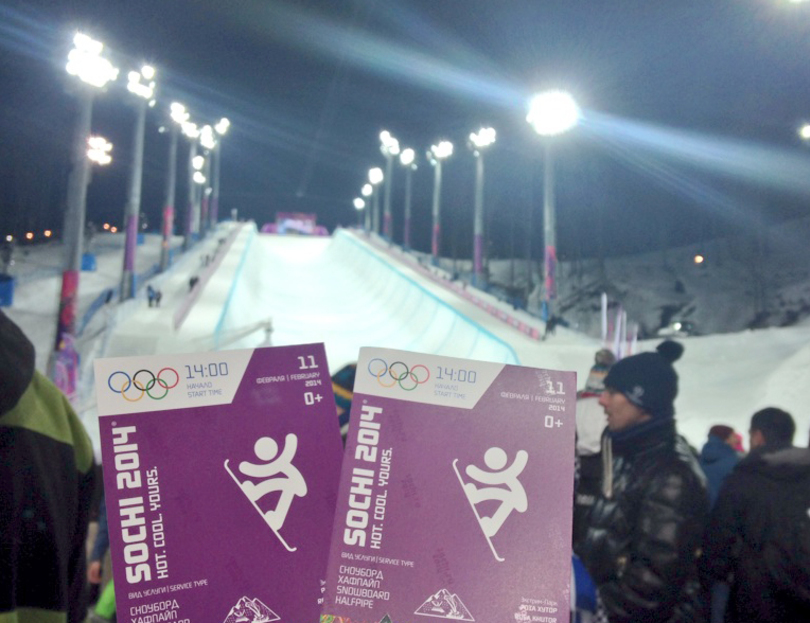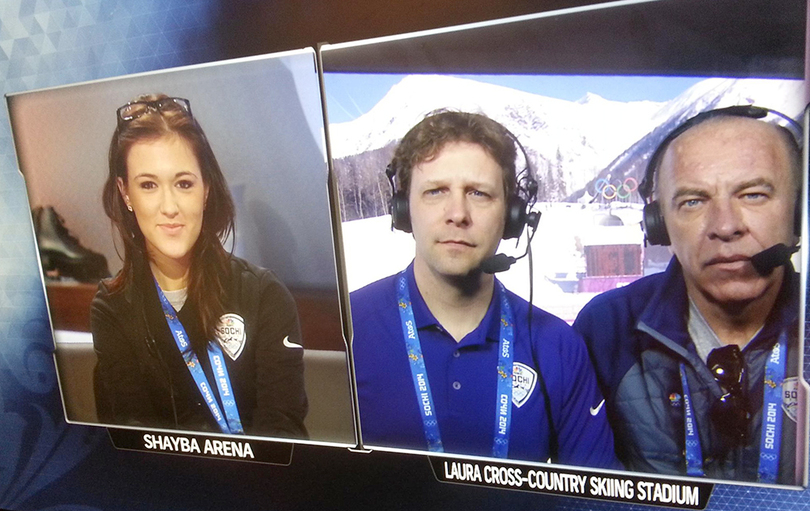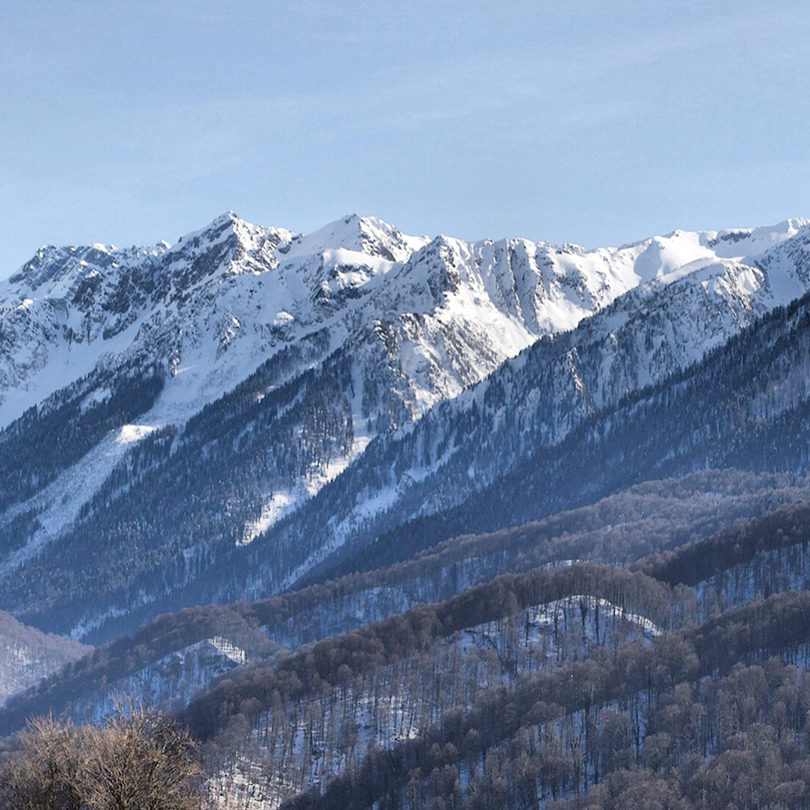On their games: SU students reflect on NBC internship, domestic issues at Sochi Olympics
Shoppers in a Michigan grocery store told Cassie DiLaura they’d “keep her in their prayers” as she prepared to leave for Sochi, Russia.
December suicide bombings had shaken Volgograd, a vital transportation hub hundreds of miles away. Militant groups threatened to disrupt the Olympics as talking heads amplified doubts about Russia’s ability to handle security, despite assurances of safety from international officials.
DiLaura dodged social media and news coverage in the weeks leading up to her trip, fearing news of violence in Sochi would deter her from an NBC internship at the 2014 Winter Olympics. DiLaura eventually gave in, checking the news after learning of the woman suicide bomber the media call the “Black Widow,” was reported to have slipped into Sochi through Russian security.
“I caved and found an article and it frightened me,” DiLaura, a junior broadcast and digital journalism major, said.
After conversations with her parents and some consideration, DiLaura chose to go through with her internship as a script production associate with NBC Sports Network. She never felt unsafe during her time in Sochi, which she described as “by far the best experience” of her life.
NBC selected 23 Syracuse University students to travel to the games, while another 10 worked in Stamford, Conn. The Feb. 7–23 games were largely considered an opportunity for President Vladimir Putin to prove Russia’s resurgence on the international stage. In the end, the games proved to be a success for Russia. DiLaura and other SU interns commended Russia’s handling of the games despite initial reservations.
Before her thoughts strayed to suicide bombers and press credentials, DiLaura went through an extensive, competitive process to be selected as an intern. NBC chose 120 interns from a pool of hundreds, cutting applicants after a paper application and a round of interviews, said Sharon Hollenback, a television, radio and film professor and NBC internship coordinator for SU.
Hollenback helped start the NBC internship program for the 2004 Summer Olympics in Athens. Since then, SU students have performed a variety of duties, including logging footage, “running” items across venues and researching for broadcasts.
Assisting international broadcasts of unpredictable events makes the NBC internships unique and immersive, Hollenback said.
“I’ve worked with multiple internships and I don’t know one as magnificent as this is,” she said.
Like DiLaura, junior broadcast and digital journalism major and NBC intern Trish Kilgannon praised the internship program after initial confusion about security.
Kilgannon saw analysis of Sochi’s security leading up to the games. She had previously traveled to St. Petersburg, where she gathered that Putin had “complete control” in Russian politics.
Kilgannon remembers watching CNN before leaving for Russia, understanding that Putin wouldn’t allow attacks to directly effect Sochi during “his games.”
“Once I got to Sochi, I realized that security was so tight there really wouldn’t be an issue,” Kilgannon said in an email.
Kilgannon was filtered through a variety of security measures on her way to NBC’s mountain sports desk, where she worked mostly transcribing interviews as a “logger.”
DiLaura was impressed with Russia’s security as well. Security officials stood outside bus stations, checking NBC credentials when employees and interns traveled to sites, she said.
Eventually, security became so familiar with DiLaura that workers recognized her face. She felt safe without ever feeling “suffocated” by security.
“Nothing happened, and I’m very fortunate for that,” DiLaura said.
Securing the Sochi area from terrorist attacks and other acts of disruption helped make the games run smoothly for Russia, said Brian Taylor, an associate professor of political science at SU who specializes in Russian politics.
“I would think for both Russia and Putin the games were a big success,” Taylor said.
Along with security, concern surrounded Russia’s law against “gay propaganda,” which holds broad conditions for publicly “promoting” homosexuality. The Russian government prompted more outrage while trying to mollify the situation, he said.
“Officials said things like ‘Gay people are welcome in Russia but please stay away from the children,’” Taylor said. “It showed kind of how clueless they are about this issue.”
Despite international showings of solidarity, like President Obama sending gay athletes on the official United States Olympic delegation, the “propaganda law” was pushed to the backburner when the games started, Taylor said. The government should have been “gratified” that there wasn’t more attention paid to the law during the actual games, he said.
Political concerns, like the gay propaganda law, lost significance when the games started, said Erika Haber, an associate professor of Russian language, literature and culture in the College of Arts and Sciences. Once politics were largely set aside, the Olympics allowed for a promotion of Russian culture, progress and athletes, she said.
Haber developed a deep understanding and appreciation for Russian culture while studying at Moscow State University as part of her master’s program. She noted that Russia’s rich cultural heritage and youth culture showed through the games.
Towering portraits of celebrated Russian authors like Tolstoy and Dostoyevsky were carried through the closing ceremonies. And young Russian athletes were “indistinguishable” from any other athletes at the games, she said.
“There was a lot of pride and hopefulness to be seen in those faces and that’s why I feel optimistic for Russia’s future,” Haber said.
DiLaura noted the solidarity foreign attendees showed with Russian athletes. She witnessed one of Russian gold medalist figure skater Evgeni Plushenko’s last career runs in the team figure skating competition before he hurt his back and was forced to retire.
“Everyone, including Americans and Canadians, was on their feet, cheering and yelling and throwing flowers on the ice. It was incredible,” DiLaura said.
In Sochi, Russia showcased the strides it has made since the Soviet Union’s demise in 1991, Haber said. But after “his games” ended, there was still a stark contrast between the country’s potential and the realities some of its people still face.
While some NBC interns experienced Sochi as a “bubble” of grandeur and showmanship, they understand the complexity of Putin’s Russia is only matched by the country’s vastness.
“I have a positive outlook on Russia based on my experiences in Sochi,” DiLaura said. “But if I went to St. Petersburg or Moscow, I could have a negative experience or see political unrest that wasn’t there in Sochi.”
Published on March 4, 2014 at 1:57 am
Contact Jacob: jspramuk@syr.edu








